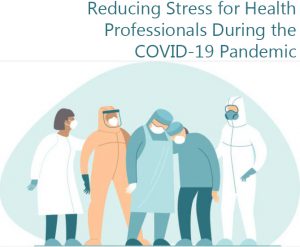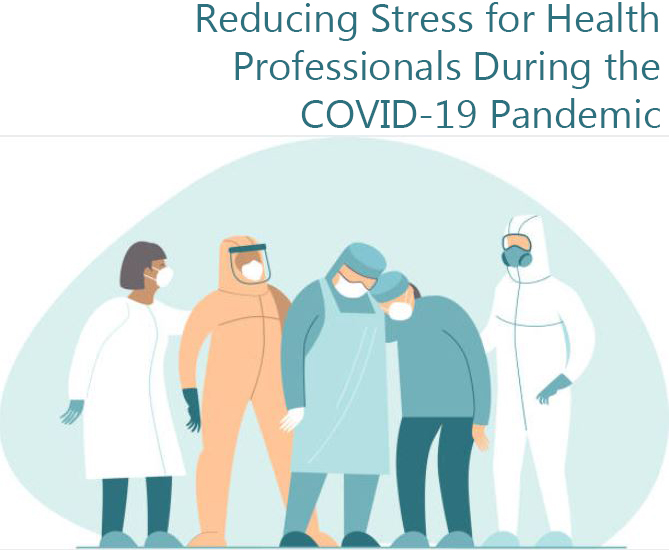
by Dr. Walter Reichman | Partner and Vice President of Org Vitality
Health professionals, even in ordinary times, juggle caring for a range of people, including their patients, their patients’ families, their colleagues and their own families and loved ones. This is stress-inducing in normal times, and of course, we are in anything but normal times. Healthcare workers are experiencing greater amounts of patient deaths, fear for their own safety, and that of their families. Since most COVID-19 patients are dying without family members present, healthcare workers have the additional burden of being present for these patients at their last moments, at times even using their own phones or iPads to connect them digitally to their loved ones. This stress has consequences; researchers in China studied 1,257 healthcare workers during the coronavirus epidemic, and found that 51% had symptoms of depression, 34% reported insomnia, 45% symptoms of anxiety, and 72% reported distress. (Lai, J., et al, 2020).
No one knows when this pandemic will end, or how many lives it will claim. The health professional must survive and even excel in this environment for the good of their patients and for their own health and well-being, but it is a tall order in a time and environment of anxiety, grief, and fear. Many healthcare workers have a reservoir of resilience that they can call upon to deal with difficult situations, but many will need support from their organization. Here are some ways healthcare workers can effectively reduce the stress and the resulting symptoms while increasing the ability to persevere and be effective.
- Admit your feelings. They are yours and they are real. Don’t deny them or feel ashamed of them, because pushing feelings away won’t make them disappear. Rather, consider the most productive way of handling them. And remember you aren’t alone; we are in a fearful situation these feels are both normal and shared.
- Don’t blame yourself. You have every right to feel angry, frustrated, sorrowful, or frightened. A productive way of handling these feelings is to discuss them with a friend or mental health care worker. Often, it helps to set your expectations; tell your friend or family member that you just need some time to vent, and ask them to listen without feeling the need to respond.
- Set Realistic Expectations. Recognize your limits, ask for help, and accept offers of help. Most people see the heroism of healthcare workers, and neighbors or other community members are eager to help them by making masks, donating meals, providing childcare, and more. Accept the help that you need in both your professional life as well as your private life.
- Pace yourself. You must look after your own well-being in order to help others. Give yourself time to rest, decompress, and even have fun. Make time to be with friends and family and put aside the stresses of your work day. Don’t listen to too much news about the virus; disconnecting while off work will help you when you return.
- Take your own advice. As a health professional, you’re likely well-versed in what it takes to remain healthy. If you’d tell your patients to eat healthy food, get enough sleep, exercise, and engage in good hygiene, then you should follow this advice as well.
- Burnt out? Get professional help. If you’re emotionally exhausted, feel hopeless, have a sense that you haven’t accomplished anything, or if you are becoming overly cynical, placing unrealistic blame on others, losing the ability to focus and concentrate, feeling indifferent to things that used to matter, or desire isolation, then it is important you reach out to a professional who can help. Most healthcare organizations have increased the support services available to staff. If you aren’t sure who to ask, contact your HR department. Remember that burnout is not your fault but a condition resulting from the stress of working in this pandemic, and everyone will understand that.
For organizations, it is important to check in with staff and keep a close watch on the mental and emotional health of workers. Surveys are one way to rapidly get feedback from many staff. OrgVitality has made an employee well-being survey available free to any organization, and is developing additional surveys on safety (based on new CDC guidelines), and on returning to work (for organizations allowing employees to return to the worksite after furloughs or working from home). Managers also must make time to ask employees how they are coping, learn what they need, and remind them of the available resources.
The focus of those support mechanisms must be broad and not limited to the care providers. A recent study found nonmedical healthcare workers experiencing greater anxiety than care providers, possibly because of “reduced accessibility to formal psychological support, less first-hand medical information on the outbreak, and less intensive training on personal protective equipment and infection control measures” (Tan, B., et al, 2020). Sometimes the greatest risk is not where you expect it. These essential workers are out on the front lines, while the majority of us get to stay home. It is our responsibility to help take care of them, just as they take care of us.
ABOUT THE AUTHOR:
Dr. Walter Reichman is a partner and vice president at OrgVitality, the president emeritus of the Psychology Coalition of the United Nations, and the main NGO representative to the Economic and Social Council of the United Nations from the International Association of Applied Psychology. He is also a Professor Emeritus from Baruch College and the Graduate Center of the City University of New York. Walter is the editor of Industrial and Organizational Psychology Help the Vulnerable: Serving the Underserved. Walter has an MBA from City College of the City University of New York and an MA and Ed.D from Teachers College of Columbia University
References:
Lai, J. et.al. (2020), Factors Associated with Mental Health Outcomes Among Health Care Workers Exposed to Coronavirus Disease. JAMA, 3(3) 203976
Tan, B et al (2020), Psychological Impact of the COVID-19 Pandemic on Health Care Workers in Singapore. Annals of Internal Medicine, https://doi.org/10.7326/M20-1083


